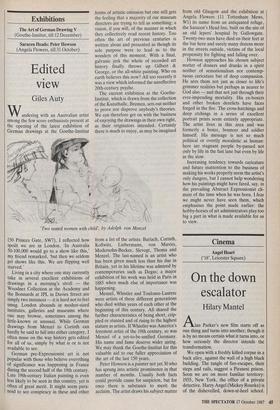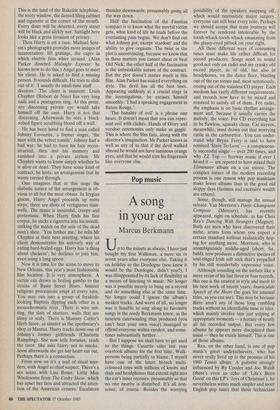Cinema
Angel Heart ('18', Leicester Square) On the down
escalator
Hilary Mantel
Alan Parker's new film starts off as one thing and turns into another; though it is by no means certain what it turns into, or how seriously the director intends the transformation.
We open with a freshly killed corpse in a back alley, against the wall of a high black building. The tangle of fire-escapes, their steps and rails, suggest a Piranesi prison. Soon we are on more familiar territory: 1955, New York, the office of a private detective. Harry Angel (Mickey Rourke) is of the dishevelled, down-at-heel school. This is the land of the Bakelite telephone, the sooty window, the dented filing cabinet and cigarette at the corner of the mouth. Every diner will be deserted, every street will be black and slickly wet. Sunlight here looks like a gross invasion of privacy.
Then Harry is on a case. Michael Sere- sin's photography provides more images of incarceration: lift gratings, the cages in which electric fans whirr around. (Alan Parker directed Midnight Express: he knows how to do this.) Angel goes to meet his client. He is asked to find a missing person. It sounds difficult. He tries to slide out of it. 'I usually do small-time stuff. . . divoices.' The client is insistent. Louis Chyphre (Robert de Niro) has very long nails and a pentagram ring. At this point, any discerning private eye would take himself off the case. Harry is not that discerning. Afterwards he sees a black- robed figure scrubbing blood off a wall.
He has been hired to find a man called Johnny Favourite, a former singer, 'the man with the velvet tonsils'. Johnny had a bad war; he had to have his face recon- structed, then lost his memory and vanished into a private asylum. Mr Chyphre wants to know simply whether he is alive or dead. They have some kind of contract, he hints, an arrangement that he wants carried through.
One imagines that at this stage the diabolic nature of the arrangement is ob- vious to all but the most obtuse. In Stygian gloom, Harry Angel proceeds up more steps; there are shots of vertiginous stair- wells. The music is mournful, creepy and portentous. When Harry finds his first corpse, he sticks a cigarette into his mouth, striking the match on the sole of the dead man's shoe. 'You bother me,' he tells Mr Chyphre at their next meeting, where his client demonstrates his unlovely way of eating hard-boiled eggs. Harry has 'a thing about chickens'; he declines to join him, even using a long spoon.
Now it is time for the scene to move to New Orleans, this year's most fashionable film location. It is very atmospheric. A victim can drown in boiling gumbo to the strains of Basin Street Blues. Sinister religious processions erupt at every turn. You may run into a group of freakish- looking Baptists dipping each other in a monochromatic river. There is wire net- ting, the slats of shutters, walls that are slimy or scaly. There is Mammy Carter's Herb Store, as sinister as the apothecary's shop in Mantua. Harry tracks down one of Johnny's former girlfriends (Charlotte Rampling). She now tells fortunes, reads the tarot. She asks Harry not to smoke. Soon afterwards she get her heart cut out. Perhaps there is a connection.
From now on it's a trail of ritual mur- ders, with Angel as chief suspect. There's a sex scene with Lisa Bonet, Little Miss Wholesome from The Cosby Show, which has upset her fans and attracted the atten- tion of the American censors. Escalators thunder downwards; presumably going all the way down.
Half the fascination of the Faustian compact is to know what the mortal victim gets, what kind of life he leads before the everlasting pain begins. We don't find out what Johnny got, except 'stardom' and the ability to give orgasms. The twist in the plot is unconvincing, because we know that in these matters you cannot cheat or beat Old Nick; the other half of the fascination is the unbreakable nature of the contract. But the plot doesn't matter much in this film. Alan Parker has staked everything on style. The devil has all the best lines. Appearing suddenly at a crucial stage in the investigations, he excuses himself smoothly: 'I had a speaking engagement in Baton Rouge.'
'The banality of evil' is a phrase one hears. It doesn't mean that you can repre- sent evil with cliches. Hands of Glory and voodoo ceremonies only make us giggle. This is where the film fails, along with the director's imagination. Mr Parker knows as well as any of us that if the devil walked abroad he would not have luminous orange eyes, and that he would trim his fingernails like everyone else.



























































 Previous page
Previous page